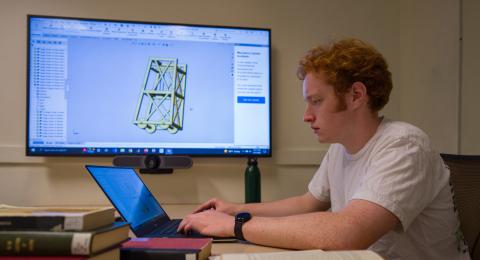The Mechanical Engineering minor at UNH is designed for students eager to grasp the core principles of mechanical engineering. You’ll build skills in design, analysis, and experimentation, with coursework in math, physics, thermodynamics, and fluid dynamics. This minor complements majors like electrical engineering, physics, and business, preparing you for diverse careers in aerospace, robotics, industrial engineering, and more. Study at a top-tier research university with access to state-of-the-art labs like the Olson Advanced Manufacturing Center and the Flow Physics Facility.
What is mechanical engineering?
The mechanical engineering minor is tailored to students who want to understand the fundamentals of mechanical engineering. You’ll develop abilities in design, analysis and experimentation through a foundation of math, physics, chemistry and computer science, including modeling, thermodynamics, statics, the mechanics of materials,and fluid dynamics. You’ll be able to select electives to complement your electrical and computer engineering or physics major. Or you can combine the skills and technological expertise of this minor with majors in the sciences, education or business to prepare for a wide variety of career opportunities in industrial fields, business, government, law or education.
Why study mechanical engineering at UNH?
You’ll analyze, design, build, test and maintain the tools and products of our growing technological society. You’ll work in state-of-the-art laboratories such as the John Olson Advanced Manufacturing Center, the Jere A. Chase Ocean Engineering Lab and the Flow Physics Facility, which houses the longest wind tunnel of its type in the world. Our faculty are leading researchers in their fields, and they care deeply about your education. The curriculum is challenging but flexible, providing opportunities that will prepare you for a variety of in-demand careers.
Potential career areas
- Aerospace
- Automotive industries
- Biomedical engineering
- EducationIndustrial engineering
- Ocean engineering
- Patent law
- Power generation
- Robotics
Curriculum & Requirements
The minor, administered by the Department of Mechanical Engineering and offers a broad introduction to mechanical engineering.
Interested students should contact the Mechanical Engineering Chair, Dr. Christopher White.
Academic policies related to Minors.
Credit toward the minor will only be given for courses passed with C- or better, and a 2.00 grade-point average must be maintained in courses for the minor.
- Courses taken on a pass/fail basis may not be used for a minor.
- No more than 8 credits used to satisfy major requirements may be used for the minor.
- No more than 2 courses or 8 credits may be from transfer coursework. Any transferred coursework must be approved by the minor coordinator.
For additional details on how to declare a minor, please visit https://www.unh.edu/registrar/academic-records/majors-minors.
Required Courses
Students must complete a minimum of six courses as follows:
| Code | Title | Credits |
|---|---|---|
| ME 441 | Introduction to Engineering Design and Solid Modeling | 4 |
| ME 503 | Thermodynamics | 3 |
| ME 525 | Statics | 4 |
| ME 526 | Mechanics of Materials | 3 |
| ME 627 | Dynamics | 3 |
| ME 608 | Fluid Dynamics | 3 |
| Total Credits | 20 | |
Electrical and Computer Engineering majors should take the following courses:
| Code | Title | Credits |
|---|---|---|
| ME 477 | Introduction to Solid Modeling | 1 |
| ECE 633 | Signals and Systems I 1 | 3 |
| ECE 634 | Signals and Systems II 1 | 3 |
| ME 503 | Thermodynamics | 3 |
| ME 525 | Statics | 4 |
| ME 561 | Introduction to Materials Science | 4 |
| Select one of the following: 2 | ||
| ME 526 | Mechanics of Materials | 3 |
| ME 608 | Fluid Dynamics | 3 |
| ME 627 | Dynamics | 3 |
1 ECE Major Required Courses.
2 The total number of credits required is 21.
Physics majors should take the following courses:
| Code | Title | Credits |
|---|---|---|
| PHYS 508 | Thermodynamics and Statistical Mechanics 1 | 4 |
| PHYS 615 | Classical Mechanics and Mathematical Physics I 1 | 4 |
| ME 477 | Introduction to Solid Modeling | 1 |
| ME 526 | Mechanics of Materials | 3 |
| ME 608 | Fluid Dynamics | 3 |
| Select one of the following: 2 | ||
| ME 643 | Machine Design | 3 |
| ME 670 | Systems Modeling, Simulation, and Control | 4 |
| ME 705 | Thermal System Analysis and Design | 4 |
1 Physics Major Required Courses.
2 The total number of credits to complete the Physics Minor will be either 18 or 19 depending on what course is selected.






















